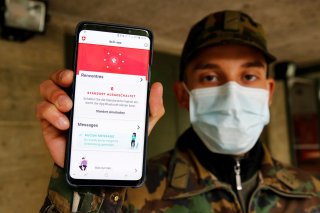Technology: Can Human Rights Survive Coronavirus?
Some social distancing techniques violate some of the core values of liberal democratic regimes.
Can human rights survive COVID-19? As it becomes more likely that the virus will affect us in multiple waves in the coming years, governments are grappling with what to do to minimize mortality until a vaccine is created.
Many of us have become familiar with the technique of social distancing and yet some argue it’s not enough. Some analysts point to China, Israel, Singapore, South Korea and Taiwan as models in the push back against the spread of SARS-CoV-2, suggesting a wholesale menu of techniques.
It seems that widespread testing, preparation and properly equipped medical personnel are only the beginning for defeating a disease like COVID-19. Invasive methods, such as tracking apps, facial recognition technology, tracing credit card transactions, using cell phone information, video footage and public posting of detailed information of the afflicted provide additional means for governments to act.
Yet such techniques violate some of the core values of liberal democratic regimes. Human rights to freedom of movement, the right to privacy, emerging data rights and the right to be forgotten are all threatened with invasive actions taken by governments. Given the challenges of COVID-19, do governments have a choice?
Human rights might be pervasive in the language of global politics, but their persistence depends on actions of individuals and their governments. We saw this when Canada took a costly stand against Saudi Arabia’s jailing of human rights activists in 2018.
Power shifts
Cutting-edge technologies are now powered by artificial intelligence (AI) and big data. The technologies are fundamentally shifting the distribution of power between individual people who provide data and entities that can make sense and use of these data. Much ink has been spilled on how Google knows us better than we know ourselves. Less has been made about how AI and big data offer governments opportunities to curtail human rights.
A calamity like COVID-19 forces liberal democracies to confront the tension between protecting individual rights and confronting an existential threat to our collective right to health. Democracies, to be sure, have their pitfalls.
In general, they are better protectors and advocates of human rights than non-democracies. However, the striking speed of COVID-19 has rendered some of democracy’s other strengths — deliberation, representation, accountability — slow, and in some senses, obstructive to responding to the virus.
Existing technologies can be employed in boosting government responses. Tracking cellphone tower pings and GPS locations have already been used by some governments to help enforce quarantine. Apple and Google are working together on an app that uses Bluetooth to alert people that they have been in contact with a positive COVID-19 case. Other similar apps exist in Singapore and Europe.
Some American municipalities are sharing personal medical details of patients affected with COVID-19 between public health and first responder units. AI has also been helpful in many ways in combating COVID-19, from the laboratory to patient settings in the diagnosis, treatment and analysis of the disease itself, to helping epidemiologists model the movement and future of the virus.
These technologies rely on big data, which is a tension for liberal democracies in particular. Taking advantage of technology in the battle against COVID-19 might make government efforts more effective, especially in the case of a pandemic when the stakes are quite high. But their effects on rights post-pandemic might be irreversible.
Even if care is taken to protect the privacy of location data, such provisions are far from perfect. At the end of the day, data has to be stored somewhere, which makes it potentially vulnerable to hacking. Governments must strike a balance between responding to the pandemic and protecting key human rights.
Public policy and privacy
This balancing act is most difficult for democracies because of their values and commitment to privacy rights. However, these concerns are not new developments.
COVID-19 simply put their importance to public policy front and centre. The crisis shows the symbiosis between big data and AI to provide relevant information upon which governments can take action. The utility can be seductive and problematic, given the nature of the technology.
Beyond privacy and data rights, governments haven’t even begun to grapple with the biases and discrimination built into the algorithms that power AI. These problems pose more subtle but no less important threats to human rights going forward. With investment in AI ongoing at remarkable speed even as we self-isolate, its usefulness in this pandemic in still formative stages should give us pause.
Currently, the AI field is mostly controlled by corporate interests. These developments also show governments must act, but they must do so deliberately and carefully, given the nature of the technology.
![]()
Wendy H. Wong, Professor of Political Science, University of Toronto
This article is republished from The Conversation under a Creative Commons license. Read the original article.
Image: Reuters

